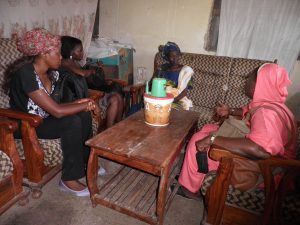Ruth Evans’ Methods in Motion blogpost shows how an approach of ‘uncomfortable reflexivity’ can help to reveal the work of emotions in cross-cultural research. Thanks to the Centre for Citizenship, Identities and Governance, The Open University, for publishing this edited version of our original blogpost.
Tag Archives: qualitative research
Interpreting ‘grief’ and emotions in cross-cultural contexts
In our latest article in Mortality, we discuss the complex process of translating and interpreting ‘grief’ and emotions in multilingual, cross-cultural settings. Our research in urban Senegal demonstrates the importance of involving interpreters and field researchers throughout the research process. This enabled us to gain insight into the cultural nuances of indigenous languages and how these are translated and potentially re-framed in the process.
Read the full post here.
How can we produce emotionally sensed knowledge on death and bereavement?
Doing research on ‘sensitive topics’, such as death and bereavement, can raise particular challenges for qualitative and cross-cultural researchers. This is often due to the deep emotions which may be evoked among both participants and researchers, and the ways that emotions are culturally produced. Our new blogpost reflects on the methodological complexities of producing ’emotionally-sensed knowledge’ about death and bereavement in our qualitative research in urban Senegal. It summarises the key messages from our article published in the International Journal of Social Research Methodology.
Read Ruth’s post about fieldwork in Senegal and other African countries
Ruth recently wrote about her experiences of fieldwork for the SAGES Advice blog: Fieldwork, Gender and Careers: ‘In my experience, fieldwork is one of the most rewarding parts of the research process. My qualitative fieldwork with young people and families in Tanzania, Uganda, Senegal and Ghana as well as in the UK has enabled me to develop a deeper understanding of the dynamics and diversity of family life and the importance of reciprocity in caring relations and community support networks. I feel privileged to have been able to listen to people’s life stories, even if only for the duration of an in-depth interview….’
Read our methodological reflections paper in progress
Read the draft paper we are presenting at the Making Sense of Dying and Death Conference in Prague, November 2014: Exploring responses to death in varying cultural contexts: methodological reflections
We have completed the fieldwork!
Ruth, Josephine and Fatou conducted the fieldwork from May to July 2014. We recruited a diverse sample of 30 families predominantly of Wolof, Serer and Hal Pulaaren ethnicities in two areas of each of the two selected cities (Dakar and Kaolack). Médina and Guédiawaye were selected as contrasting areas of Greater Dakar, while Touba Extension and Kasnak were selected in Kaolack following discussions with Senegal Advisory Group members and representatives of APROFES and AFEME, women’s rights organisations. Families in the four areas were identified through a local facilitator, local or religious leaders and efforts were made to ensure diversity in ethnic and religious affiliation and socio-economic status.
In total, we conducted in-depth interviews with 59 family members (2 in each family) who had experienced the death of a relative. The majority of families were Muslim and a small number (6) were Roman Catholic. Family members were selected on the basis of differing generational positions within households and on the basis of their relationship to the deceased. We also prioritised children and young people where possible. We interviewed 20 key informants, comprising local and religious leaders, community-based organisations, government and NGO representatives working at local and national levels. We also conducted four focus groups (one in each area) with groups of women and young people to explore community members’ perceptions of the neighbourhood and discuss cultural and religious practices and norms surrounding death, mourning and grief.
All the audio-recorded interviews and focus groups are now being transcribed and translated into French and English and we are developing our approach to data analysis through reflexive conversations among the research team. We plan to present a paper reflecting on the methodological issues raised by qualitative cross-cultural research that investigates responses to death at the Inter-disciplinary.net conference, Making Sense of Suffering, Dying and Death in Prague, 1-3 November 2014 , if you’re planning to go!
We have started the fieldwork!
We held our first Advisory Group meetings in Reading and Dakar at the end of April and early May. Our discussions were very useful in refining our research instruments and thinking about language issues and our approach to accessing participants. Since then, Ruth, Josephine and Fatou have started the fieldwork in Dakar and Kaolack, working in two contrasting districts in each city. Key contacts with women’s organisations and local facilitators are helping us to access key informants and a diverse sample of families who have experienced a death in the last five years.


